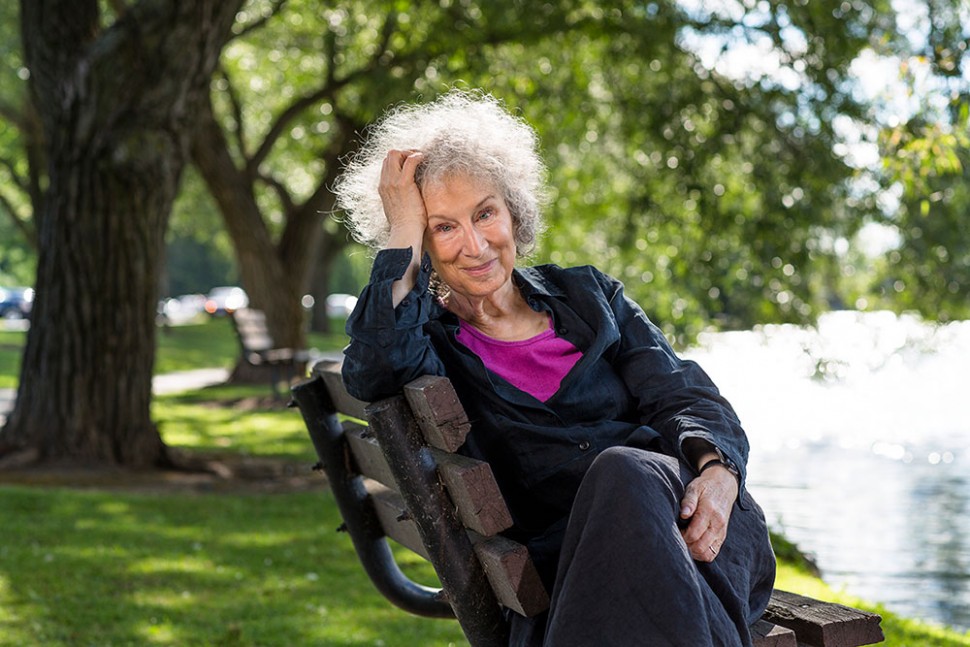Margaret Atwood, author of “The Handmaid’s Tale,” will visit Northwestern University Tuesday, Oct. 30, to discuss the implications her 1985 dystopian novel has on our contemporary world. Her visit is part of the One Book One Northwestern program.
“It's astonishing to me how ‘The Handmaid's Tale’ -- a book first published in 1985, over 30 years ago -- has found itself more timely now than it was when it appeared,” Atwood said. “This is due in part to the excellence of the MGM/Hulu television series, but also to the times we live in -- times I could not possibly have predicted when I was writing the book.”
Atwood will take part in conversations with Northwestern faculty members on both the Evanston and Chicago campuses. The Chicago campus event will take place at noon in Northwestern Pritzker School of Law’s Thorne Auditorium, 375 E. Chicago Ave., and the Evanston campus event will be held at 4:30 p.m., in Pick-Staiger Concert Hall, 50 Arts Circle Drive.
At the Chicago event, the author will be joined in conversation by law professor Deborah Tuerkheimer, who specializes in law and legal theory surrounding sexual assault, and Angela Lawson, associate professor of clinical obstetrics and gynecology and psychiatry at Northwestern University's Feinberg School of Medicine. In Evanston, Atwood will be joined by English professor and One Book Faculty Chair Helen Thompson.
The downtown event is at capacity and, as of Wednesday, few seats were available to the Evanston event. Priority has been given to Northwestern students, faculty and staff. If all seats are not claimed by Oct. 25th, then they will be made available to the general public. The Evanston event will be live-streamed to an overflow viewing space in the Block Museum of Art, which seats 150. Tickets are also required to attend the live-stream. For updated information and to register for tickets, visit https://nbo.universitytickets.com/.
Set in a dystopian future in which the U.S. government has been overthrown by a theocratic authoritarian regime that uses fertile women as handmaids to bear children for the all-controlling ruling class, “The Handmaid’s Tale” is a modern classic that explores the politics of religion and gender and offers a warning about a future the author hopes will never come to pass.
The main character and narrator, the Handmaid Offred — one of many women forced to reproduce with the regime’s ruling men in the wake of environmental collapse that has led to widespread infertility — is the property of a commander in the Republic of Gilead.
Offred holds out hope that she will one day be reunited with her husband and daughter while, in defiance of her captors and the law, secretly recording her story.
“Atwood’s ‘The Handmaid’s Tale’ offers the Northwestern community an opportunity to engage today’s conversation about women’s status in America and across the globe,” Thompson said. “Atwood’s vision of a near future, patriarchal dystopia invites us to think hard about what feminism is and how it matters to us in our everyday lives — not just because we are gendered selves, but because we are historical actors, agents of acceptance, change and resistance.”
Atwood has long been a literary titan, but “current events have polished the oracular sheen of her reputation,” says The New Yorker.
“The Handmaid’s Tale” has been translated into more than 40 languages; it has been made in to a film, an opera, a ballet and, of course, is the inspiration for an MGM/Hulu original series that aired in April 2017 to rave reviews — winning Emmys, Golden Globes and Critics’ Choice Awards for its first season.
Atwood started writing the novel in West Berlin in 1984, prior to the fall of the Berlin Wall, at a time when the threat of a militaristic authoritarian superpower was all too real during the Cold War.
At the time, she was unsure if she would be able to persuade American readers that the U.S. had been transformed from a liberal democracy into a theocratic dictatorship. Today, in the wake of the Women’s March and the #MeToo movement, heightened anxieties and the proliferation of extremist views, the patriarchal society Atwood creates in the novel feels, to some, like a warning.
“It has taken over 200 years and much labor for the right of women to be treated as full human beings to be recognized; some of the gains are very recent indeed,” Atwood said.
“And now it seems there is a concerted effort to push women back in time, not only in the United States but in many countries. This is why audiences have reacted so strongly to the show, and why it has become an internationally understood symbol,” Atwood said.
“The Handmaid’s Tale” is not a prediction, Atwood states in a new introduction to the book.
“Let’s say it’s an antiprediction: If this future can be described in detail, maybe it won’t happen. But such wishful thinking cannot be depended on either,” Atwood writes.
Atwood, whose work has been published in 35 countries, is the author of more than 40 books of fiction, poetry and critical essays. In addition to “The Handmaid’s Tale,” Atwood’s novels include “Alias Grace,” which won the Giller Prize in Canada; “The Blind Assassin,” winner of the Booker Prize in 2000; “Cat’s Eye,” also shortlisted for the Booker Prize, and “Oryx and Crake,” shortlisted for the 2003 Man Booker Prize.
The One Book One Northwestern Program is sponsored by the Office of the Presidentand will include related films, lectures and other programming throughout the coming academic year. The campus-wide read is chosen by the University’s One Book selection committee.


